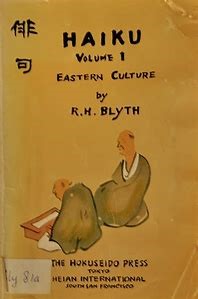
I found the first book of R. H. Blyth’s four volume set, Haiku, (originally published between 1949-1952) in a used book store on St. Mark’s Place. If haiku seems no more pertinent to you than, say, heraldry—one more subject about which even an informed person “need not be ashamed to know nothing”[1]—you may be mollified to hear I had an excuse to check Eastern Culture since I was Christmas shopping for a nephew who’s on his way to Japan this spring. The book’s cover—“Oriental brown simple rough peasant cloth”—got me to open “the Blyth Haiku bibles” (pace Allen Ginsberg, Allen Ginsberg). I fell in…
“Plop!”
To quote the last line of “the most famous haiku” with frog-and-pond as translated by Blyth—scholar-gypsy who brought the East to Beats and Salinger (see J.D.’s bow to Blyth in “Seymour, An Introduction”: “…haiku, but senryu, too…can be read with special satisfaction when R. H. Blyth was on them. Blyth is sometimes perilous, naturally, since he’s a highhanded old poem himself, but he’s also sublime.”)